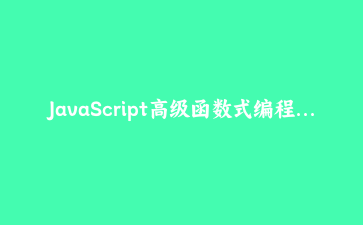免费资源下载

引言:函数式编程在现代JavaScript中的重要性
随着前端应用复杂度的不断提升,传统的命令式编程模式在处理复杂数据流时往往显得力不从心。函数式编程(FP)以其声明式的特性、无副作用的函数和强大的组合能力,为构建可维护、可测试的前端应用提供了全新的思路。本文将深入探讨如何利用函数式编程构建优雅的数据处理管道。
函数式编程核心概念
1. 纯函数(Pure Functions)
纯函数是函数式编程的基石,具有以下特性:相同的输入总是返回相同的输出,并且不会产生副作用。
// 不纯的函数
let taxRate = 0.1;
function calculateTax(amount) {
return amount * taxRate; // 依赖外部状态
}
// 纯函数
function calculateTaxPure(amount, rate) {
return amount * rate; // 只依赖输入参数
}2. 不可变性(Immutability)
函数式编程强调数据不可变,任何修改都会创建新的数据副本。
// 可变操作(不推荐)
const user = { name: 'John', age: 30 };
user.age = 31; // 直接修改原对象
// 不可变操作
const updatedUser = { ...user, age: 31 }; // 创建新对象3. 高阶函数(Higher-Order Functions)
接收函数作为参数或返回函数的函数,是构建函数管道的关键。
// 高阶函数示例
function withLogging(fn) {
return function(...args) {
console.log(`调用函数: ${fn.name}, 参数:`, args);
const result = fn(...args);
console.log(`结果:`, result);
return result;
};
}实战案例:构建电商数据分析管道
项目需求分析
我们需要处理电商平台的订单数据,实现以下功能:
- 数据清洗和验证
- 计算关键业务指标
- 生成销售报告
- 数据可视化预处理
- 支持管道式组合操作
核心工具库:Ramda简介
Ramda是一个专门为函数式编程风格设计的JavaScript工具库,提供了大量实用的纯函数。
// 安装Ramda
// npm install ramda
import {
pipe, compose, map, filter, reduce,
prop, path, sortBy, groupBy, uniq
} from 'ramda';完整数据处理管道实现
class DataProcessingPipeline {
constructor() {
this.transformations = [];
}
// 添加转换步骤
addTransformation(fn) {
this.transformations.push(fn);
return this; // 支持链式调用
}
// 执行管道处理
process(data) {
return pipe(...this.transformations)(data);
}
}
// 示例数据
const rawOrders = [
{
id: 1,
customer: { id: 101, name: 'Alice', tier: 'VIP' },
items: [
{ product: 'Laptop', price: 1200, quantity: 1, category: 'Electronics' },
{ product: 'Mouse', price: 25, quantity: 2, category: 'Electronics' }
],
date: '2024-01-15',
status: 'completed',
discount: 0.1
},
{
id: 2,
customer: { id: 102, name: 'Bob', tier: 'Regular' },
items: [
{ product: 'Book', price: 30, quantity: 3, category: 'Education' },
{ product: 'Pen', price: 5, quantity: 5, category: 'Education' }
],
date: '2024-01-16',
status: 'completed',
discount: 0
},
{
id: 3,
customer: { id: 103, name: 'Charlie', tier: 'VIP' },
items: [
{ product: 'Headphones', price: 150, quantity: 1, category: 'Electronics' },
{ product: 'Case', price: 20, quantity: 1, category: 'Accessories' }
],
date: '2024-01-16',
status: 'pending',
discount: 0.15
}
];
// 构建数据处理管道
const analyticsPipeline = new DataProcessingPipeline();
// 1. 数据清洗:只处理已完成的订单
analyticsPipeline.addTransformation(
filter(order => order.status === 'completed')
);
// 2. 计算每个订单的总金额
analyticsPipeline.addTransformation(
map(order => {
const itemsTotal = order.items.reduce(
(sum, item) => sum + (item.price * item.quantity), 0
);
const finalAmount = itemsTotal * (1 - order.discount);
return {
...order,
totalAmount: finalAmount,
originalAmount: itemsTotal
};
})
);
// 3. 按客户等级分组
analyticsPipeline.addTransformation(
groupBy(order => order.customer.tier)
);
// 4. 计算各组的统计信息
analyticsPipeline.addTransformation(
map(orders => ({
count: orders.length,
totalRevenue: orders.reduce((sum, order) => sum + order.totalAmount, 0),
averageOrderValue: orders.reduce((sum, order) => sum + order.totalAmount, 0) / orders.length,
orders: orders
}))
);
// 执行管道处理
const processedData = analyticsPipeline.process(rawOrders);
console.log('处理后的数据:', processedData);高级函数组合技巧
1. 柯里化(Currying)的应用
柯里化将多参数函数转换为一系列单参数函数,便于函数组合。
import { curry, filter, propEq } from 'ramda';
// 柯里化函数示例
const multiply = curry((a, b) => a * b);
const double = multiply(2); // 部分应用
const triple = multiply(3);
console.log(double(5)); // 10
console.log(triple(5)); // 15
// 在实际数据处理中的应用
const filterByStatus = curry((status, orders) =>
filter(propEq('status', status), orders)
);
const getCompletedOrders = filterByStatus('completed');
const getPendingOrders = filterByStatus('pending');2. 透镜(Lenses)进行深层数据操作
透镜提供了一种声明式的方式来访问和修改嵌套对象。
import { lensPath, lensProp, set, view, over } from 'ramda';
// 创建透镜
const customerNameLens = lensPath(['customer', 'name']);
const totalAmountLens = lensProp('totalAmount');
// 使用透镜
const order = {
id: 1,
customer: { name: 'Alice', tier: 'VIP' },
totalAmount: 1250
};
// 查看数据
console.log(view(customerNameLens, order)); // 'Alice'
// 修改数据(不可变)
const updatedOrder = set(customerNameLens, 'Alicia', order);
// 转换数据
const applyTax = over(totalAmountLens, amount => amount * 1.1);性能优化与内存管理
1. 惰性求值(Lazy Evaluation)
通过惰性求值避免不必要的计算,提升性能。
class LazySequence {
constructor(compute) {
this.compute = compute;
}
map(fn) {
return new LazySequence(() => {
const value = this.compute();
return Array.isArray(value) ? value.map(fn) : fn(value);
});
}
filter(fn) {
return new LazySequence(() => {
const value = this.compute();
return Array.isArray(value) ? value.filter(fn) : value;
});
}
value() {
return this.compute();
}
}
// 使用惰性序列
const lazyData = new LazySequence(() => rawOrders)
.filter(order => order.status === 'completed')
.map(order => order.totalAmount)
.value(); // 只在调用value()时执行计算2. 记忆化(Memoization)
缓存函数计算结果,避免重复计算。
function memoize(fn) {
const cache = new Map();
return function(...args) {
const key = JSON.stringify(args);
if (cache.has(key)) {
return cache.get(key);
}
const result = fn(...args);
cache.set(key, result);
return result;
};
}
// 记忆化昂贵计算
const expensiveCalculation = memoize((data) => {
console.log('执行昂贵计算...');
// 模拟复杂计算
return data.reduce((sum, item) => sum + item, 0);
});实际业务场景应用
1. 表单验证管道
const createValidator = (rules) => (data) => {
return pipe(
...rules.map(rule => values => ({
...values,
errors: {
...values.errors,
...rule(values.data)
}
}))
)({ data, errors: {} });
};
// 定义验证规则
const validationRules = [
values => values.data.email && values.data.email.includes('@')
? {}
: { email: '邮箱格式不正确' },
values => values.data.password && values.data.password.length >= 6
? {}
: { password: '密码至少6位' }
];
const validateForm = createValidator(validationRules);2. API响应数据处理
const processApiResponse = pipe(
// 提取数据
path(['data', 'results']),
// 数据清洗
filter(item => item.active && item.verified),
// 数据转换
map(item => ({
id: item.id,
name: `${item.firstName} ${item.lastName}`.trim(),
email: item.contact.email,
department: item.department.toUpperCase()
})),
// 排序
sortBy(prop('name')),
// 分组
groupBy(prop('department'))
);测试策略与最佳实践
1. 函数式代码的测试
// 纯函数易于测试
describe('数据处理函数', () => {
test('应该正确计算订单总金额', () => {
const order = {
items: [
{ price: 100, quantity: 2 },
{ price: 50, quantity: 1 }
],
discount: 0.1
};
const result = calculateOrderTotal(order);
expect(result).toBe(225); // (100*2 + 50*1) * 0.9
});
});2. 错误处理策略
// 使用Either Monad处理错误
const { Either } = require('ramda-fantasy');
const safeParseJSON = (str) => {
try {
return Either.Right(JSON.parse(str));
} catch (error) {
return Either.Left(`解析JSON失败: ${error.message}`);
}
};
// 在管道中使用
const processDataSafely = pipe(
safeParseJSON,
Either.map(processApiResponse),
Either.fold(
error => ({ error, data: null }),
data => ({ error: null, data })
)
);总结
函数式编程为JavaScript开发带来了全新的思维方式和技术工具。通过本文的学习,你应该掌握:
- 函数式编程的核心概念和原则
- 如何使用Ramda等函数式工具库
- 构建可组合的数据处理管道
- 高级函数组合技巧和性能优化策略
- 在实际业务场景中的应用模式
函数式编程不是银弹,但在处理复杂数据流、构建可维护的前端应用方面具有独特优势。建议在实际项目中逐步引入函数式编程概念,结合团队技术栈和业务需求,找到最适合的应用方式。





